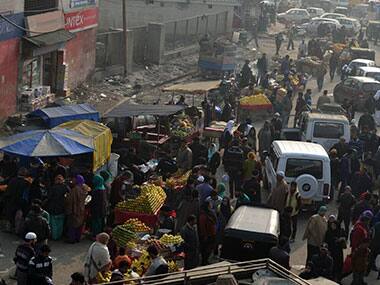Srinagar: While the deadlock over government formation persists in Jammu and Kashmir, the state has plunged into its “worst-ever” financial crisis with an unfunded gap of over Rs 5,000 crore in overall resources, forcing the state government to stop all new developmental projects. Experts say the crisis has resulted from pending liabilities which have crossed over Rs 2,000 crore across the state treasuries. What is worse, the central government has not only choked the flow of funds to the state over political uncertainty, it has left thousands of flood victims in the state in the lurch. [caption id=“attachment_2097815” align=“alignleft” width=“380”]  A market in Srinagar: Naresh Sharma[/caption] In its last budget for 2014-15, the state government had projected a plan size of Rs 11,900 crore, including Rs 7300 crore for the main plan, Rs 4000 crore assistance under Centrally Sponsored Schemes (CSS) and Rs 600 crore assistance under the Prime Minister’s Reconstruction Plan (PMRP). While there is still a month before the end of the current financial year, the state is yet to receive 60 percent of the fends that are still pending under its annual plan. Despite the recent assurance by the Union Finance Minister, Arun Jaitley, to the state’s Governor NN Vohra that the centre would bail out the state government, nothing seems to have happened in this regard. A senior official in the state’s finance department said the pending bills of contractors have already touched Rs 900 crore while General Provident Fund bills are hovering around Rs 800 crore. “The liabilities in the state treasuries have increased from Rs 2200 crore to Rs 2700 crore,” the official said. The central government has also told the state that it has been diverting funds to salaries and new projects which, experts say, is gross indiscipline on the part of the state government. Former President of the Federation Chamber of Industries Kashmir, Shakeel Qalander, attributed this “worst-ever” financial crisis to the plan assistance being not approved and released on time. He said the cost escalation made in centrally sponsored schemes was also not paid on time. “There should be a mechanism wherein the state government should be taken to task for any irregularity. Then there has to be a new mechanism that will allow the flow of funds directly to centrally sponsored schemes," Qalander told Firstpost. But economists have blamed the previous government led by Omar Abdullah for the crisis. They says the state urgently needs an infusion of over Rs 2200 crore to tide over this problem. The state government is now planning to raise market borrowings of Rs 300 crore to handle the situation. This in addition to market borrowings of Rs 1500 crore already resorted to early this year. Mushtaq Sidiqi, a former special secretary in the state’s finance department told Firstpost that the governments will borrow money from the Jammu and Kashmir Bank. The government, he says, will always look to the bank for overdraft facilities as and when need for funds arose. “RBI was not happy with the way the bank was accommodating the requests of the state government for frequent overdrafts beyond stipulated limits to help it overcome its financial shortfalls. Thus the regulator’s instructions in this regard were, so to say, rampantly brushed aside. In the long run, such a system worked to the disadvantage of the state government which had to bear a high rate of interest on excess withdrawals. Beyond Rs 1500 crore, the rate of interest would be as whopping as over 20%,” he said. Another official said there are many instances in which the state government borrowed up to Rs 3000 crores as overdraft. “After the centre government released the money, the borrowings would be repaid. But the Omar Abdullah government changed it all. The fund manager of the state government is now RBI, not Jammu and Kashmir Bank,” he said. “Frequent recourse to such overdrafts entailed added burden of high interest. As the overdrafts will always remain in the vicinity of Rs 2000 to 2500 crore, higher than the outer limit of Rs 1500 crore set by the RBI, one can imagine the quantum of interest burden that the state was almost regularly bearing," Sidiqi said. “We have been crying over the years that there should be a change in fiscal year based on the climatic condition in the state. There should be a mechanism where funds are not lapsed so that we can utilize them in next fiscal year. Demand was for change of fiscal year or a lapse fund. After the disbanding of the planning commission, the current fiscal plan is yet to be finalized or money released," Qalander said. When the ensuing political stalemate between Peoples Democratic Party and BJP over government formation ends, the elected government could take up the issue of financial crisis with the centre and the situation could improve in state. “Since the political instability is continuing in the state, it appears that till the time an elected government starts functioning, the financial crises is likely to continue,” Qalander said.
While the deadlock over government formation persists in Jammu and Kashmir, the state has plunged into its “worst-ever” financial crises with an unfunded gap of over Rs 5,000 crore in overall resources, forcing the state government to stop all new developmental projects.
Advertisement
End of Article


)
)
)
)
)
)
)
)
)



